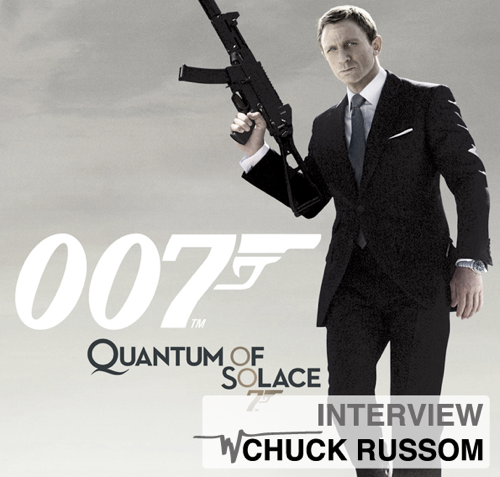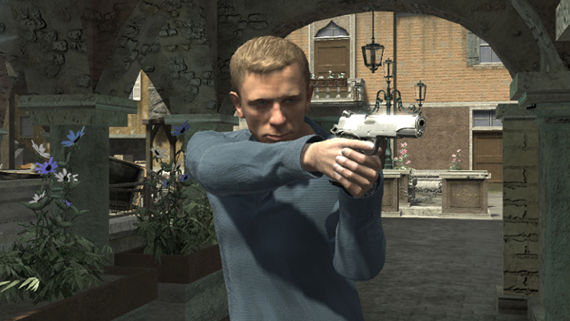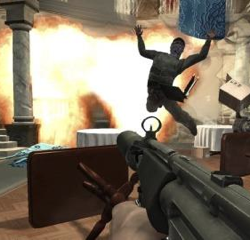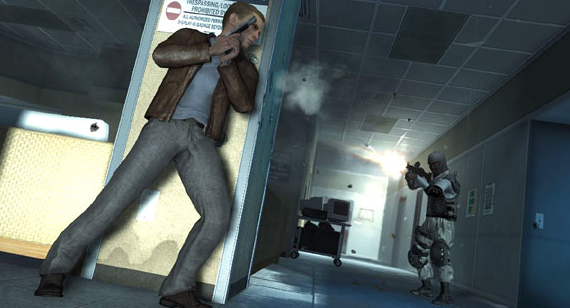Sadly, the Chuck Russom Special is coming to the end. Here’s the last interview we made, this time talking about “Quantum of Solace” (the video game), where Chuck was the Audio Lead.
Designing Sound: So ,how do you get hired on Treyarch and how do you get involved with Quantum of Solace?
Chuck Russom: I am a huge, life-long fan of the Bond franchise. I even have a poster from You Only Live Twice (Sean Connery era Bond Film) hanging in my dining room. I had always wanted to work on a project set in that world. When Activision picked up the Bond game license a few years back, I started looking into which studio would be doing the games. Everything sort of fell into place and worked out perfectly.
Treyarch was doing the first game. They were based in LA and looking for an Audio Director. Through a friend, I was able to get my resume into Activision and then into Treyarch. They invited me in to interview and I basically told them that I was a Bond nut and I must work on the game. I guess it worked, because they hired me on.
DS: How early you started to work on the game? How long was it?
CR: I started on the game in February of 2007, it shipped in November 2008. I spent 20 months working exclusively on QoS. That is the longest I have ever worked exclusively on any one title.
DS: The 007 is very iconic… How important was for you? I mean there’re different films on 007, different games etc, and QoS features some scenes and stories from the QoS film and also things from Casino Royale. How those elements influenced you to work on the sound of the game?
CR: Working on the franchise was really a very personal thing to me. It was the only game that I worked on where I came in as a hardcore fanboy. I really approached everything I did from the perspective of a fan. I first interviewed job a few weeks before the Casino Royale movie came out. I knew the game would be based on Casino Royale and its sequel. Before I accepted the job, it was important that I was able to see Casino Royale. I knew that it was a reboot. I loved the book and was hopeful the movie would be the best yet, but with reboots it can be hit and miss. I wasn’t sure that I wanted to work on the franchise if they totally screwed up the movie. I saw Casino Royale as soon as it was released and absolutely loved the new direction. It cemented the fact that I had to work on the game.
DS: How was the storytelling influenced by sound? What were the decisions on the sound side to enhance the story of the game?
CR: If you think about the sound of Bond, you instantly think of the music. Everyone knows the Bond theme. For me, music was the one thing in the game that constantly reminded you that it was a Bond game. Our composer was Christopher Lennertz. I had worked with Chris before on MOH: Pacific Assault and he’d also done the music for the last EA Bond game; From Russia with Love. He came by the studio one day and we talked about the music from Casino Royale and just Bond music in general. It was awesome; he totally got the music of Bond.
Our ideas were totally in sync. We already had a great relationship from the last time we worked together it was great to have the chance to work with him a second time. Chris is so easy to work with and such talented composer. Working with him on QoS was one of the highlights of the project for me.
DS: Lots of guns, explosions, car scenes, all kind of places, etc. I think the field recording had to be heavy. How was that?
CR: For the first several months on the project, there was little game to actually work on. I devoted most of my time recording or planning recording sessions. I’d drive around LA with recording gear in my car looking for construction sites to record for the construction chase level. Record anything I found in my day to day encounters that seemed cool. I hired Foley artists at the Sony Pictures lot to do all of the player movements and body falls. We also recorded a lot of other sounds on the Foley stage. Things like debris, impacts, grenade bounces, weapon Foley, etc. We recorded two days of gun fire and one day of silenced guns and bullet impacts. We drove out the Arizona desert for a day of explosion recording. We also booked two days at a wrecking yard where we dropped cars from a forklift. All of this was in addition to the day to day sounds that members of the team would go out and record. There was more recording for QoS than any other game I’ve worked on. I demanded it. I approached the game as if it were a big Hollywood summer blockbuster. There were some battles with the producers over budgets, but it was worth it, and I won out in the end!
DS: I think another challenging feature was the dialogue. How and where you recorded it?
CR: Dialog was a massive task on QoS. I acted as the Dialog Supervisor for all versions of the game (360/PS3, PC, PS2, DS, and Wii). I hired Rob King, owner of Green Street Studios, to be our Dialog and Casting Director. We ended up recording several celebrities from both Quantum of Solace and Casino Royale. This was a huge challenge, as we had to track down every actor and go to them. As the QoS film was finishing shooting, the producers had us come out to Pinewood Studios in London, where they had arranged some of the actors for VO sessions. We were based in England for a few weeks recording at Pinewood and also tracking down other actors throughout Europe. Rob and I went on one whirlwind European trip that had us leaving London on a Friday afternoon, recording Mads Mikkelsen in Berlin on Saturday, recording Eva Green on Sunday in Dublin, and returning to London that same say so that we could prep for our next session in London.
On the way from Berlin to Dublin, we had a flight change in Paris, and we ended up missing our flight, which was the last of the night. We were stuck in Paris for the night with no hotel and no understanding of the French language! It was a pretty interesting experience. Luckily, we got the first flight out in the morning, landed in Dublin, and made it to the studio just before Eva Green arrived! Later, when I thought about the experience and did the math I realized we had been in 4 countries in 40 hours with no sleep. That was one of those experiences that both sucked and was really awesome at the same time.
Being a movie game we were dependant on the script from the film and it came to us very late. Not only was it late, but it changed a lot. Our game script and game design was way behind. We had our writer with us in London and he was writing scripts the day before we had Judi Dench in for a session. All the while, the game design wasn’t final and everything was always changing! The whole dialog process was a mess. We would have celebrity actors recording lines for levels that weren’t designed yet. We had no idea if they would fit the game, and we could only hope that we would get the actors back for a pickup session. There were so many drafts of the script; it was really hard to keep up with all the changes. I also ended up writing all of the AI battle dialog, because our writer was so busy with the rest of the game script.
There is no way we could have pulled it all off if it wasn’t for Rob. While we were in London, talking about the script and our recording plans, he was the one saying that we weren’t going to be able to get it done if we didn’t get moving. He was looking at the deadline and the amount of work and was worried that there wasn’t enough time. The game team had no clue; they would just keep going with their design changes and never lock the script. Everything about the design and script was so up in the air, but looking at the schedule, Rob knew that we had to get back to LA and continue with our recording as soon as we landed! We started casting for our non-celebrity sessions while we were still in England. I listened to a lot of the auditions and made casting picks on the plane back from London. Once back in LA, we went right into scheduling the non-celebrity session. We were in the studio recording for 8-9 hours, 4 actors a day, for a month. As chaotic as it all seemed, it ran like clockwork. Rob had every detail sorted out. The sessions ran like a machine.
DS: You were also the implementer on all the sides. What tools you used for that? How was the process done?
CR: We had a good sized sound team on QoS, up to 6 people at the end. Everyone was really talented and embraced using the tech to implement their sounds. Sound Designers working on levels used the game’s level editor and level scripts to implement their sounds. We had a tool (that hardly worked) to implement sounds onto animations. I handled the dialog and music implementation. For the dialog, I worked closely
with the game scripters who helped implement most of it. I would just follow behind them and change timings and things that didn’t seem to work as I’d hoped. I did all of the music implementation myself. We
didn’t have a fancy music tool. I had to go through all of the level scripts and find the places that I wanted music to start and stop and put calls in for that. We did have a slightly interactive music system, where the stealth music would change to a higher intensity version if the AI detected you. For the most part, the music was scripted by hand, it was me putting calls in that said, when this event happens, play this piece of music and then switch or stop music when this occurs.
DS: You played different roles and you had to make lots of decisions… How good was that for you? How did you feel with this lead position?
CR: As an Audio Lead on a project, you need to position yourself to best help the project succeed. When I first started on QoS, I was the only sound designer. That went on for probably 6 months. During that early period, I spent much of my time recording and building a library and creating a lot of the core sounds like movement, bullet impacts, etc. I also got a good head start on the weapon sound design. As production ramped up, our sound team grew. We got to the point where the sound design was under control, but the dialog and music really didn’t have focus. Sound design is my first love, but I needed to focus my efforts toward dialog and music to help the project succeed. I supervised the production and implementation of both. In addition, I did finish working on the weapon sounds design, I wasn’t about to give up all sound design….
DS: What is the most you learned from working on this game? We everyone learn from both bad and good things, so… how was your learning experience there?
CR: QoS was the most challenging project that I’ve ever worked on. I had never worked on a game for so long before. I’d never come in so early and had as much pre-production time, but still felt so behind as the game neared completion. There were a lot of changes in direction over the course of the project. A lot of staff changes. Trying to be in sync with an in-development film was a nightmare. There were quite a few times when you just weren’t sure what game you were working on anymore, where it was going. By the end, I was working the jobs of 3 people and working the hours to go with it. The only thing you can do is go with your instincts, rely on what got you through the problem projects of the past. The end goal is to have a great sounding game ready when it is time to ship. We had a very diverse, talented, and dedicated sound team and we achieved the goal of shipping a great sounding game.




Fqgil Ccfpq louis vuitton outlet Tbxyse Shvog http://louis-vuitton-sito-ufficiale.moonfruit.com/
Waaxpmonw Bysdq louis vuitton Fszwn Ssyui http://louis-vuitton-borsa.moonfruit.com/